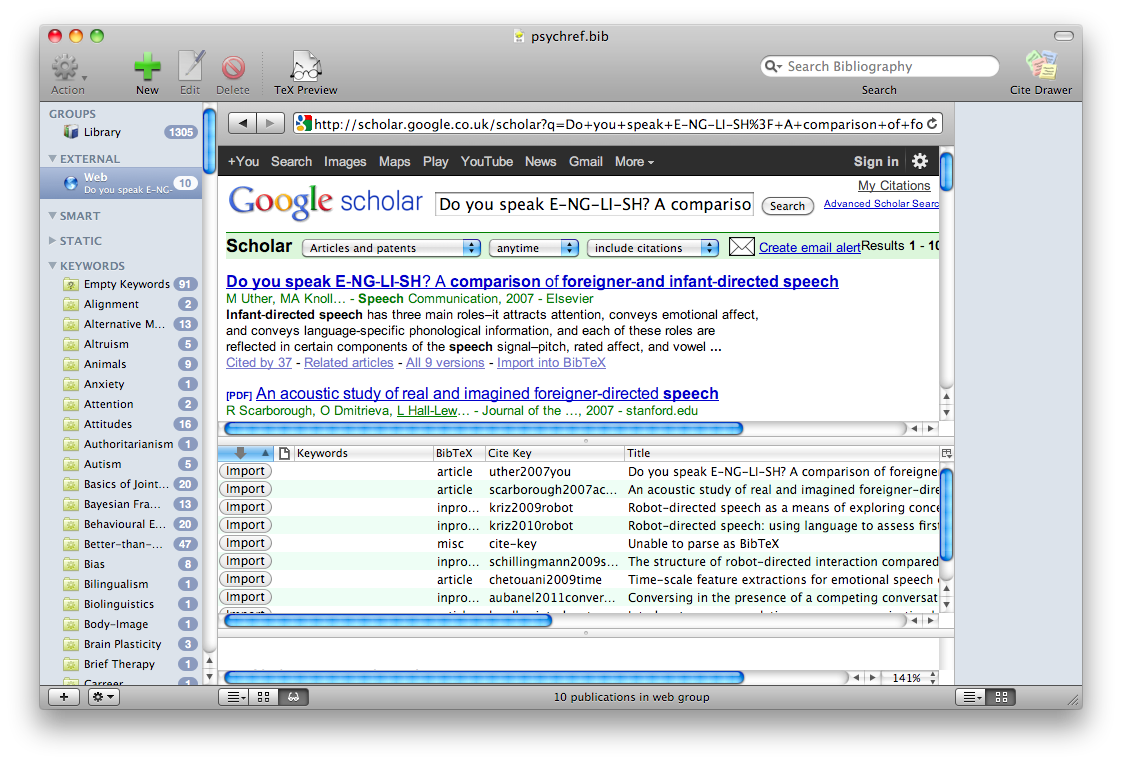

A feature introduced in November 2013 allows logged-in users to save search results into the "Google Scholar library", a personal collection which the user can search separately and organize by tags. Ī major enhancement was rolled out in 2012, with the possibility for individual scholars to create personal "Scholar Citations profiles". Some of these are now defunct in 2016, Microsoft launched a new competitor, Microsoft Academic.
GOOGLE SCHOLAE IN BIBDESK WINDOWS
Around this period, sites with similar features such as CiteSeer, Scirus, and Microsoft Windows Live Academic search were developed. In 2011, Google removed Scholar from the toolbars on its search pages, making it both less easily accessible and less discoverable for users not already aware of its existence. In 2007, Acharya announced that Google Scholar had started a program to digitize and host journal articles in agreement with their publishers, an effort separate from Google Books, whose scans of older journals do not include the metadata required for identifying specific articles in specific issues. In 2006, a citation importing feature was implemented supporting bibliography managers, such as RefWorks, RefMan, EndNote, and BibTeX. Scholar has gained a range of features over time. One of the original sources for the texts in Google Scholar is the University of Michigan's print collection. This goal is reflected in the Google Scholar's advertising slogan " Stand on the shoulders of giants", which was taken from an idea attributed to Bernard of Chartres, quoted by Isaac Newton, and is a nod to the scholars who have contributed to their fields over the centuries, providing the foundation for new intellectual achievements. Their goal was to "make the world's problem solvers 10% more efficient" by allowing easier and more accurate access to scientific knowledge. Google Scholar arose out of a discussion between Alex Verstak and Anurag Acharya, both of whom were then working on building Google's main web index.

5 Search engine optimization for Google Scholar.The University of Michigan Library and other libraries whose collections Google scanned for Google Books and Google Scholar retained copies of the scans and have used them to create the HathiTrust Digital Library.

Google Scholar has been criticized for not vetting journals and for including predatory journals in its index. This estimate also determined how many documents were freely available on the internet. An earlier statistical estimate published in PLOS One using a Mark and recapture method estimated approximately 80–90% coverage of all articles published in English with an estimate of 100 million. For content to be indexed in Google Scholar, it must meet certain specified criteria. Google Scholar uses a web crawler, or web robot, to identify files for inclusion in the search results. Released in beta in November 2004, the Google Scholar index includes peer-reviewed online academic journals and books, conference papers, theses and dissertations, preprints, abstracts, technical reports, and other scholarly literature, including court opinions and patents.
GOOGLE SCHOLAE IN BIBDESK FULL
Google Scholar is a freely accessible web search engine that indexes the full text or metadata of scholarly literature across an array of publishing formats and disciplines.


 0 kommentar(er)
0 kommentar(er)
